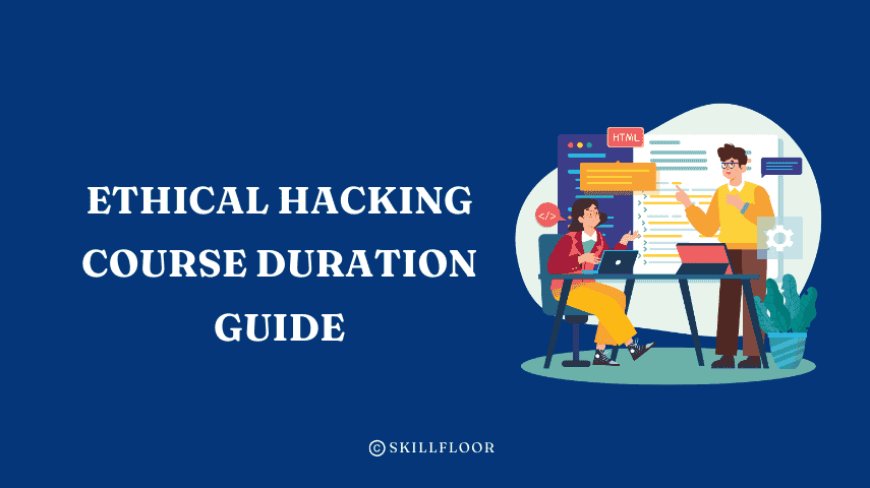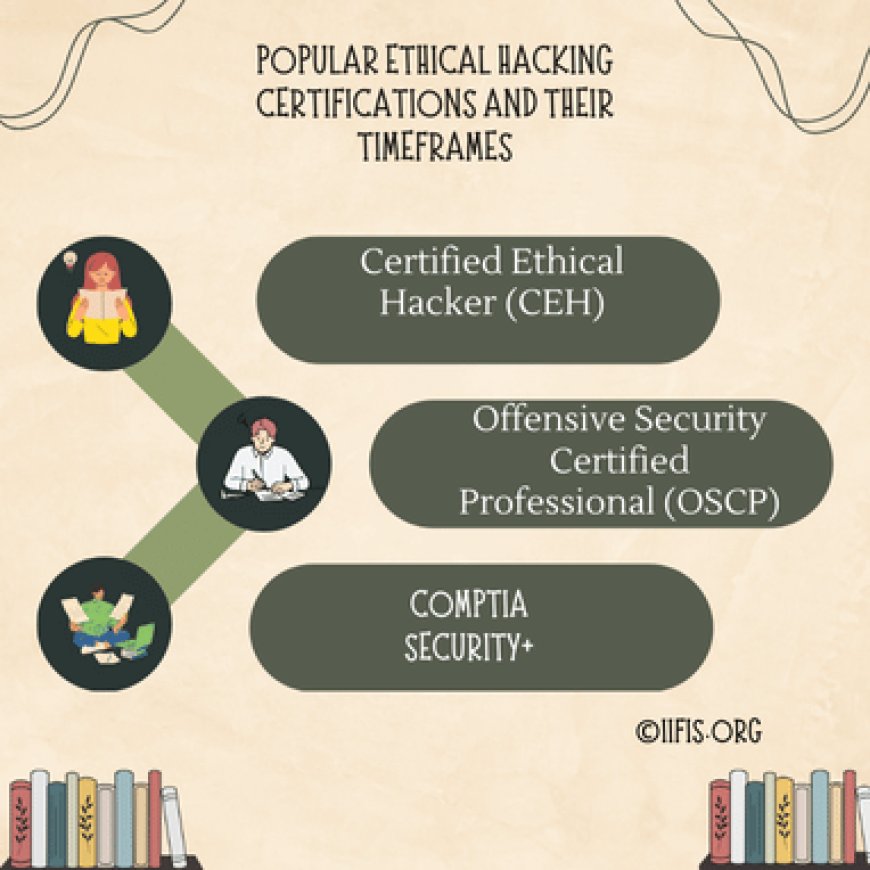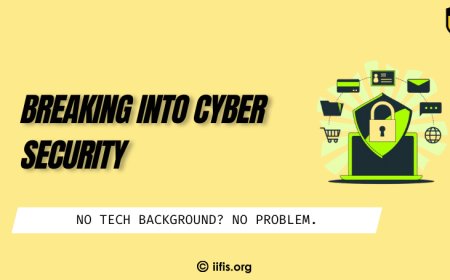Ethical Hacking Course Duration Guide
Discover how long it takes to complete ethical hacking courses, from beginner to advanced levels, including certifications like CEH and OSCP. Explore factors like course type, format, and study pace

Cybersecurity has become a top priority for businesses and individuals alike. With the increasing number of cyber threats, ethical hacking has emerged as a crucial skill for safeguarding systems and data. If you're considering a career in ethical hacking, one of the first things you'll want to know is how long it takes to become proficient in this field. In this guide, we’ll break down the different factors that influence the duration of an ethical hacking course, from beginner programs to advanced certifications, helping you choose the right path based on your goals and expertise.
Factors Affecting Course Duration
-
Course Type: Beginner vs. Advanced
-
Beginner Courses: Shorter, usually a few weeks to a few months, focusing on basic concepts and skills.
-
Example: A beginner cybersecurity course might last 4–6 weeks.
-
Advanced Courses: Longer, from several months to a year, with more in-depth material and hands-on practice.
-
Example: Advanced courses like penetration testing can last 3–12 months.
-
Certifications: Time Differences
-
CEH (Certified Ethical Hacker): Requires about 40–60 hours of study (1–3 months).
-
OSCP (Offensive Security Certified Professional): More challenging, often needing 200–400 hours (3–6 months or longer).
-
CISSP (Certified Information Systems Security Professional): Typically takes 100–150 hours (3–6 months).
-
Learning Pace: Self-Paced vs. Instructor-Led
-
Self-Paced: Flexible but depends on your motivation. You can finish quickly if experienced, or take longer if you need more time.
-
Example: A self-paced CEH course could take 2–6 months.
-
Instructor-Led: Follows a set schedule, often with weekly classes, so the duration is more predictable.
-
Example: An instructor-led OSCP course might last 12 weeks.
-
Prior Knowledge: Impact of Experience
-
With Experience: You can finish faster since you already know some basics.
-
Example: An IT professional might complete OSCP in 3 months.
-
Without Experience: Beginners need more time to learn the basics before tackling advanced topics.
-
Example: A beginner may need 6–12 months to prepare for CEH.
Average Duration for Ethical Hacking Courses
-
Beginner Courses (Estimated duration: 4–6 weeks)
-
These courses introduce basic ethical hacking concepts, tools, and techniques.
-
The focus is on foundational knowledge like networking, security fundamentals, and basic hacking practices.
-
Typically, you’ll find online courses or classroom settings that last about 1–1.5 months.
-
Intermediate to Advanced Courses (Certifications: 2–6 months)
-
Certified Ethical Hacker (CEH) or other mid-level certifications fall into this category.
-
More in-depth than beginner courses, these cover penetration testing, vulnerability analysis, and more advanced tools.
-
CEH: Around 2–3 months of study time.
-
OSCP (Offensive Security Certified Professional): 3–6 months for preparation due to its hands-on labs and practical exam.
-
Bootcamps (Intensive programs: 1–3 months)
-
Bootcamps are designed to immerse you in ethical hacking over a short period, with daily or weekly intensive sessions.
-
They are usually structured to last between 1–3 months and focus on hands-on labs and real-world hacking scenarios.
-
These are ideal for fast-tracking skills, though they require a higher time commitment during the program.
Course Format and Its Impact on Duration
-
Online vs. In-Person Learning
-
Online Learning: Offers flexibility, allowing you to set your own schedule. You can move faster or slower depending on your availability and understanding. This is ideal for those with other commitments or who prefer to study at their own pace. Online courses tend to have more flexible deadlines and can be completed over a few weeks to several months.
-
Example: An online ethical hacking course might be completed in 2 months if you dedicate more hours, but it could take up to 6 months if you study part-time.
-
In-Person Learning: Usually follows a fixed schedule with set class times. The structured nature of in-person classes means you’ll have to follow the instructor's pace, often completing the course in a specific timeframe.
-
Example: A classroom-based ethical hacking course might last 8–12 weeks, with classes a few times a week.
-
Self-Paced Learning
-
Self-Paced Learning: Gives you full control over how fast or slow you progress through the material. This is beneficial for learners who want the freedom to study around other commitments or those who might need more time to grasp complex topics.
-
Benefits: You can complete the course quicker if you're motivated or have prior knowledge, or you can take your time if you need more study hours.
-
Example: A self-paced CEH course could be completed in as little as 2 months for someone studying full-time, but it might take up to 6 months for someone studying part-time.
-
Full-Time vs. Part-Time Options
-
Full-Time: These courses are more intensive, with daily or near-daily sessions, allowing you to complete the course faster. Full-time programs often compress the curriculum into a shorter period, typically ranging from a few weeks to a few months.
-
Example: A full-time bootcamp in ethical hacking might last 1–3 months, with daily lessons and hands-on practice.
-
Part-Time: Designed for learners who may have other commitments, these courses spread out the material over a longer period. While less intense, part-time courses take longer to complete, usually extending to several months.
-
Example: A part-time ethical hacking course might take 6 months to complete, with evening or weekend classes.
Popular Ethical Hacking Certifications and Their Timeframes

1. Certified Ethical Hacker (CEH)
-
-
Duration: On average, it takes 2–3 months to prepare for the CEH exam, assuming part-time study (around 8–10 hours per week).
-
Exam Requirements: The CEH certification focuses on various hacking techniques and penetration testing. The exam has 125 multiple-choice questions to be completed in 4 hours, and a passing score is typically between 60–85%, depending on the exam version.
-
Preparation Tips:
-
Focus on learning key topics such as footprinting, scanning networks, malware threats, and cryptography.
-
Hands-on practice with penetration testing tools like Metasploit and Nmap will be crucial.
-
Use official EC-Council materials or online courses, and supplement with practice exams.
-
-
-
Offensive Security Certified Professional (OSCP)
-
Duration: Preparation for the OSCP exam often requires 3–6 months of dedicated study and hands-on practice, depending on prior experience.
-
Exam Requirements: The OSCP exam is a 24-hour practical exam where candidates must hack into a series of machines to earn points. You need 70 out of 100 points to pass, which requires successfully exploiting multiple vulnerabilities and submitting a detailed report.
-
Preparation Tips:
-
Use the PWK (Penetration Testing with Kali Linux) course materials provided by Offensive Security as your primary guide.
-
Spend significant time in the OSCP labs, working on hands-on exercises and practicing exploiting machines.
-
Focus on networking, web application vulnerabilities, privilege escalation, and scripting (Python, Bash).
-
Review online resources like OSCP blogs and community write-ups to understand common exam scenarios.
-
-
-
CompTIA Security+
-
Duration: Most learners prepare for Security+ within 2–3 months, typically studying 8–10 hours per week.
-
Exam Requirements: Security+ is an entry-level certification that covers general cybersecurity concepts. The exam consists of 90 multiple-choice and performance-based questions, with a passing score of 750 out of 900. You have 90 minutes to complete the exam.
-
Preparation Tips:
-
Focus on key topics like network security, risk management, cryptography, and compliance.
-
Make use of official CompTIA materials, study guides, and practice tests to understand the exam structure.
-
Hands-on labs are less intensive than CEH or OSCP but still important for understanding real-world applications of the material.
-
Review online study groups or forums for additional tips and exam experiences.
-
-
Tips for Completing an Ethical Hacking Course Faster
-
Maximizing Study Efficiency Through Consistent Practice
-
Set a Study Schedule: Create a regular study routine where you dedicate time each day or week. Consistency helps you retain information and build skills steadily, rather than cramming.
-
Focus on Key Areas: Identify the most important topics for the certification or course and concentrate on them. For ethical hacking, focus on areas like network security, penetration testing tools (e.g., Nmap, Metasploit), and web application vulnerabilities.
-
Practice Problem-Solving: Ethical hacking is very hands-on, so work on solving real-world hacking challenges consistently, such as through Capture The Flag (CTF) platforms like Hack The Box or TryHackMe.
-
Set Milestones: Break down your learning into smaller, manageable goals. This helps you track progress and keep momentum.
-
Utilizing Supplementary Resources (Books, Online Tutorials)
-
Books: Supplement your course material with well-regarded books in the field of cybersecurity and ethical hacking. For example, "The Web Application Hacker's Handbook" or "Hacking: The Art of Exploitation" can deepen your understanding.
-
Online Tutorials and Blogs: There are numerous free resources that can help you learn faster. Websites like Cybrary, YouTube channels, and cybersecurity blogs often have detailed tutorials and practical advice for specific hacking techniques or tools.
-
Practice Exams: If you’re preparing for a certification like CEH or OSCP, practice exams will familiarize you with the question format and help you gauge your readiness, saving time in the long run.
-
The Role of Hands-On Experience and Labs in Accelerating Learning
-
Prioritize Hands-On Labs: Ethical hacking is best learned through doing. Spend as much time as possible working in labs or on real-world scenarios. Practicing in environments like Kali Linux or through online platforms (e.g., Hack The Box, TryHackMe) gives you direct experience and builds problem-solving skills faster than theory alone.
-
Work on Realistic Simulations: Labs that simulate real-world networks and environments help you apply what you’ve learned more quickly. The more you practice with real vulnerabilities and attacks, the better you'll be at understanding and exploiting them, thus shortening the learning curve.
-
Participate in CTF Competitions: Capture The Flag challenges not only test your knowledge but also force you to think critically and quickly. Engaging in CTF competitions can sharpen your skills faster than conventional study methods.
Course duration depends on factors like format, content depth, your availability, and learning style. When choosing a course, consider how much time you can commit, whether you prefer structured or self-paced learning, and if the program offers flexible options that suit your schedule.
Take action based on your goals. Whether you're advancing your career or exploring new fields, starting a course is a step toward achieving your ambitions. For those interested in Islamic finance, International Islamic Financial Institutions (IIFIS) offer excellent programs to help you specialize in this area. Start now and move closer to your goals.























